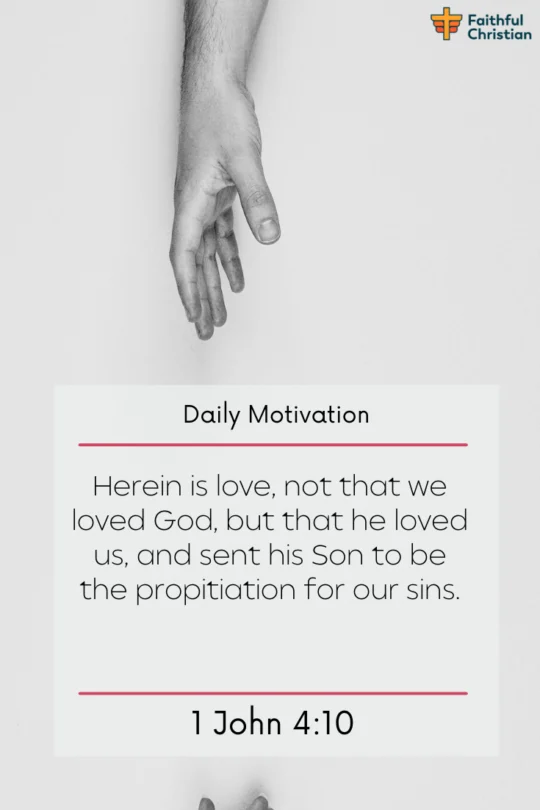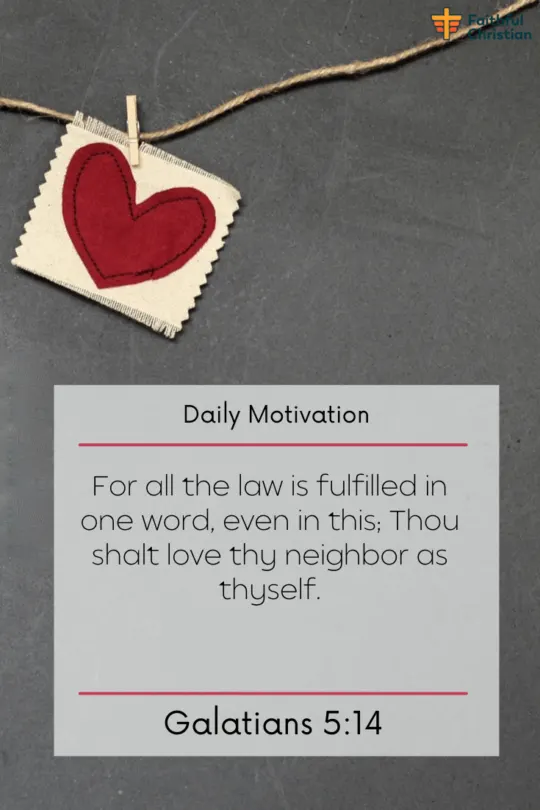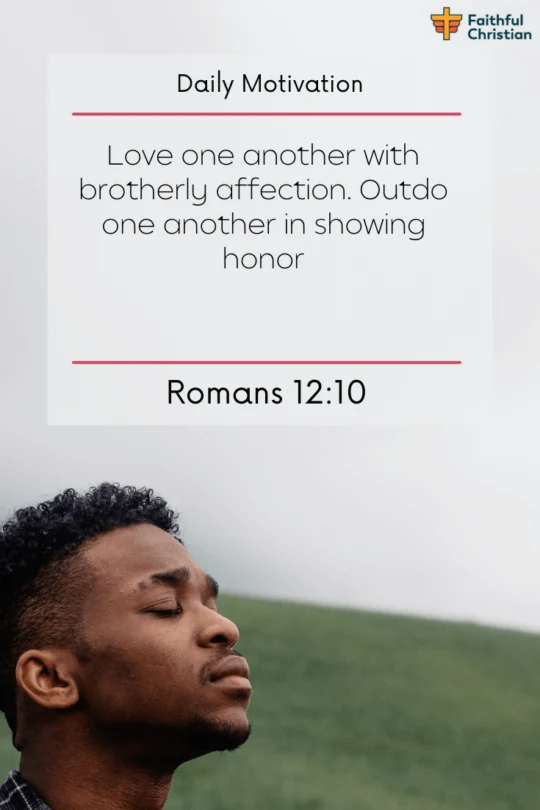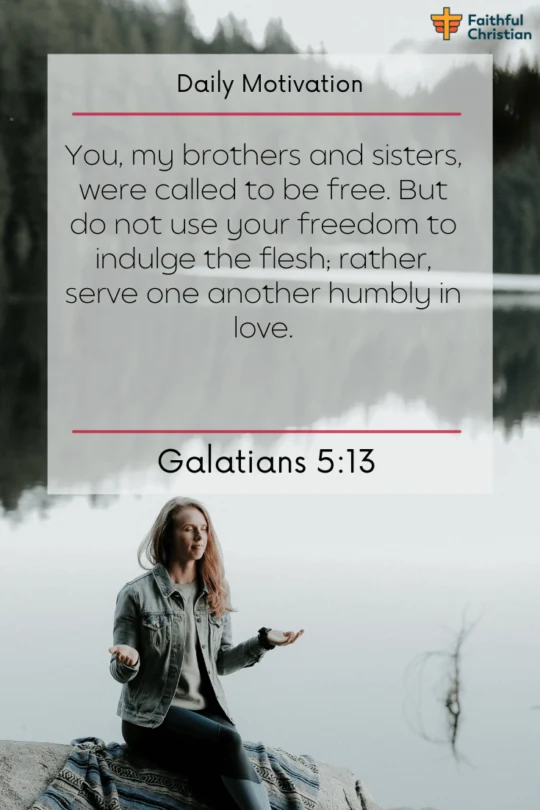“love one another.”
The first time I came across this verse, I wondered, “why should our love be geared towards one another?”
Are we not supposed to love God alone?
Surprisingly, this phrase is repeated about eleven times in the scriptures.
That, of course, shows it is an essential commandment of God.
So, how do we love one another?
A few weeks ago, I operated on a woman who had a uterine tear.
Before the surgery, I asked the husband to donate a pint of blood, and he did.
Just after the surgery, there was an urgent need for another blood transfusion.
I work in a rural setting where blood and its products are not readily available.
I knew that this woman might bleed to death if I did nothing.
So, I had to make myself available as a donor.
I had never met this young lady before, but I already understood the pain of losing a close friend.
So, what’s my point?
There is a yardstick to measure our “love for one another” – Ourselves.
Will I feel hurt if I was treated the same way? Do I want others to be kind towards me?.
I have put together inspiring bible verses about loving one another. Read and be blessed.
Recommended for you
- Bible verses about God’s love and protection
- Bible verses about loving others to guide you
- Bible Verse neighbor against neighbor: Important Scriptures
- 23 Bible Verses About Faith And Love: Important Scriptures
Love One Another Bible verses
1. John 13:34

A new command I give you: Love one another. As I have loved you, so you must love one another
John 13:34 introduces us to a revolutionary type of love. Jesus commands, “Love one another. As I have loved you, so you must love one another.” This isn’t ordinary affection. It’s a deep, abiding commitment to others’ well-being, defined by the very love Jesus demonstrated.
Consider the parable of the Good Samaritan. An unlikely hero, the Samaritan, arrives on the scene, finding a beaten, helpless man. He could’ve walked by, as others did.
But instead, he showed a selfless, risk-taking love. He bandaged the man’s wounds and took him to an inn, even paying for his stay. That’s the kind of love Jesus demonstrated, a love that extends even to the point of self-sacrifice.
Now, let’s apply this to everyday life. Imagine at the supermarket, a shopper spills their groceries. You could walk past, but instead, you stop. You help. That’s compassion. That’s kindness. This is where the commandment breathes life, in the mundane moments of our day.
Consider Mother Teresa. She served the poor in India with unwavering dedication. She fed the hungry, cared for the sick, and comforted the dying. Echoing the Good Samaritan’s spirit, she saw the ignored, the destitute, and loved them, just as Jesus did.
Reflect on 1 John 4:11: “Dear friends, since God so loved us, we also ought to love one another.” This verse reinforces the call to love others in the way God loved us. It reminds us that we’re recipients of divine love and, therefore, should extend that love to others.
This call to love transforms communities. Envision a world where everyone loved like Jesus. Hatred and division dissolve, replaced by empathy, unity, and mutual respect. Understanding, not judgment. Compassion, not indifference. It’s not only transformative for us as individuals but society at large.
In summary, the directive to “Love one another, as I have loved you” is more than a command. It’s a transformative journey. It molds us, our relationships, and our communities. It sets a divine standard of love that, when embraced, creates a world reflective of the love Jesus embodied.
2. 1 Peter 4:8

Above all, love each other deeply, because love covers over a multitude of sins.Offer hospitality to one another without grumbling
Love – it’s a force so powerful that it can blanket a multitude of sins. This profound idea is at the heart of 1 Peter 4:8. It teaches us that love encourages forgiveness and tolerance.
We can explore this concept further with Proverbs 10:12. It pits hatred, a stirrer of conflict, against love, a soother of wrongs. This powerful imagery paints love as a healer, overshadowing all errors with its light.
Diving into 1 Corinthians 13:7, we see another portrayal of love. Love protects, trusts, hopes, and perseveres, transcending human flaws. This love envelops us, regardless of our past.
To illustrate the transformative power of love, let’s travel back in time to the epoch of Genesis 45:1-15, to a dusty desert in ancient Egypt. Here, we meet Joseph, sold into slavery by his own brothers, left to languish in the depths of despair.
Yet, when his brothers stood before him, haunted by their past actions, Joseph chose love. He chose to forgive. I imagine he looked into their remorse-filled eyes and saw them not as the brothers who had betrayed him, but as men who had lost their way.
He saw them through the lens of love and chose to cover their multitude of sins with his forgiveness.
In more recent history, we find a similar story in Nelson Mandela. Imprisoned for 27 years, Mandela emerges with love. He forgives his captors, reconciling a nation torn by apartheid. His story demonstrates the power of love to heal and restore.
Love, as these stories reveal, is a decision. It’s choosing forgiveness over grudges, unity over division. In this choice lies love’s healing power.
The core message of 1 Peter 4:8 is clear: love deeply, as Jesus loved us. It’s this deep, divine love that truly transforms us and the world. So, let’s choose love, covering sins and creating harmony.
3. 1 John 4:7-10

Beloved, let us love one another: for love is of God; and every one that loveth is born of God, and knoweth God. He that loveth not knoweth not God; for God is love.

In this was manifested the love of God toward us, because that God sent his only begotten Son into the world, that we might live through him.

Herein is love, not that we loved God, but that he loved us, and sent his Son to be the propitiation for our sins.
The essence of love traces back to a divine source – God. He’s the architect of love, beautifully depicted in 1 John 4:7-10. It implies that love stems from God. Individuals who grasp this love, spread it generously. Love then is not confined to close circles, but mirrors God’s boundless love for us.
God demonstrated His love through a monumental sacrifice. He sent His Son for our redemption, a reflection of divine love unparalleled by any human expression.
Consider the biblical tale of Ruth and Naomi. Ruth, despite losing her husband, stayed with her mother-in-law, Naomi. Her love surpassed personal security, exemplifying divine love. The takeaway? Comprehending God’s love prompts us to go the extra mile in loving others.
Look at the unconditional love parents harbor for their children. Even in the face of mistakes, parental love doesn’t waver. This unwavering love mirrors God’s love for us. Despite our sins, He remains our guide, our beacon of forgiveness.
Embracing God’s love can transform us. It changes our perspective, making us more forgiving, understanding, and tolerant. This love is a catalyst for personal growth and spiritual evolution.
Lastly, 2 Corinthians 13:11 underscores the bond between knowing God and showing love. It stresses unity, comfort, and peace, attributes deeply connected with love. Equally, 1 John 3:1 marvels at the love God has bestowed upon us, so profound that we are called His children.
In conclusion, truly knowing God equates to understanding love. To love as He loves us, we must soak in the profundity of His love.
As we embody this love in our everyday interactions, our lives become a testament to His divine love. Let’s strive to love authentically, reflecting the divine love God shows us continually.
4. Romans 13:8

Owe no man any thing, but to love one another: for he that loveth another hath fulfilled the law
Romans 13:8 offers profound insight. Essentially, this verse connects love and law, intertwining the two concepts into a single, divine commandment.
A similar principle is echoed in Matthew 22:39 where Jesus, the supreme lawgiver, asks us to “Love your neighbor as yourself.”
The unique concept of love, likened to a debt in Romans 13:8, is a powerful idea. Unlike other debts that burden us, this debt of love enriches our lives. It brings joy and unity and is a constant obligation for us all.
The story of Zacchaeus offers a perfect biblical illustration. As a tax collector, Zacchaeus was far from loved by his community. But when Jesus entered his life, Zacchaeus’ heart was transformed by love. He turned from greed to generosity, demonstrating the potent triumph of love over life’s obstacles.
We see a parallel in today’s world. Those who serve selflessly at homeless shelters and food banks embody this ‘debt of love’. These individuals provide more than just physical sustenance; they exemplify the obligation to love our neighbors as God loves us.
Their actions resonate with James 2:8, which reiterates the biblical commandment of neighborly love.
But the love-commandment transcends personal conduct. It fosters societal harmony. If every societal law was underpinned by love, our communities wouldn’t just exist; they’d flourish. In such a society, the communal and personal become one as we live out the golden rule: Love one another, as I have loved you.
Romans 13:8 isn’t just a verse; it’s a divine summons. A call to express God’s love, bestowed upon us, by extending it to others. In fulfilling this commandment, we uphold the highest law.
Indeed, it’s through this law of love that we reflect the divine and draw nearer to God.
5. Galatians 5:14

For all the law is fulfilled in one word, even in this; Thou shalt love thy neighbor as thyself.
In Galatians 5:14, we find a divine decree, “Love your neighbor as yourself.” This principle encapsulates all commandments. It forms the bedrock of all laws. Let’s explore its significance.
Matthew 7:12 harmonizes with Galatians 5:14. It states, “Do unto others what you’d have them do to you.” This forms the foundation of our discussion. Love for our neighbors is crucial. But how is this love demonstrated practically?
Again, a clear illustration is the parable of the Good Samaritan in Luke 10:25-37. It recounts a man left to die by the roadside. His savior was not the passing priest or Levite, but a Samaritan, showing us that love transcends societal norms and prejudices.
In modern times, advocates tirelessly work for the rights and welfare of refugees and migrants. They embody love, seeing beyond race, borders, and personal comfort.
Such examples underline love’s fulfillment of the law: it’s love that prevents us from stealing, lying, or causing harm. Respect for others’ dignity, rights, and worth lies at the core of love.
Finally, let’s reflect on the transformative power of love in a community. When guided by love, respect flourishes, unity is strengthened, and peace prevails.
This is perfectly encapsulated in James 2:8, “If you really keep the royal law found in Scripture, ‘Love your neighbor as yourself,’ you are doing right.” Thus, embodying this commandment transforms us into catalysts of positive change in our communities.
As we strive to understand and apply Galatians 5:14, remember the essence of Jesus’ love: selfless, sacrificial, and unconditional. This love, which we are called to reflect, fulfills the law and transforms our hearts and communities.
Let us all strive to embody this commandment daily. By doing so, we will effect positive change, one act of love at a time.
6. Ephesians 2:4-5

But because of his great love for us, God, who is rich in mercy, made us alive with Christ even when we were dead in transgressions—it is by grace you have been saved
Ephesians 2:4-5 beautifully unfolds the magnitude of God’s love. The verses speak of divine mercy, bridging the gap between human sinfulness and God’s infinite love. It’s a profound illustration of His grace, expansive as an ocean and more profound than any sin we may commit.
In this divine love, we find a beacon of mercy, perfectly embodied in the parable of the prodigal son. The father’s forgiveness reflects God’s love, forgiving us even when we falter. It’s a love that transcends human understanding.
Reflect on this in your daily life. Imagine forgiving a friend who has deeply wronged you. Isn’t it challenging, yet rewarding? In this act, you emulate God’s mercy, echoing His love and forgiveness. This reflection of divine love is transformational.
Understanding God’s love changes us. It is not just about forgiveness, it’s also about personal growth. When we fathom the depth of His love, it instills in us an urge to love others similarly. It sparks a transformation that echoes throughout our lives.
God’s love, showcased in His sacrifice for us while we were still sinners, serves as our guide. Referenced in Romans 5:8, this divine love stands as a testament to how we should love others. It serves as our blueprint, our guidepost in loving others as He loves us.
Titus 3:4-5 reiterates this message, emphasizing God’s mercy and kindness. God’s love illuminates our paths, guiding us even in our darkest moments. His love calls us to replicate it, loving others with the same fervor.
To conclude, Ephesians 2:4-5 sets a clear mandate: Grasp the extent of God’s love, let it transform you, and use it as your blueprint to love others. In following Jesus’ command (John 13:34), we must love one another as He loved us.
With God’s love as our guide, we can navigate life’s journey, sharing His love with those around us.
7. Colossians 3:14

And above all these put on love, which binds everything together in perfect harmony.
At the heart of Colossians 3:14 lies a powerful principle – love, the ultimate virtue. This Scripture underlines love’s supremacy and its binding force, uniting all other virtues in perfect unity.
Consider the biblical friendship of Jonathan and David. Jonathan, driven by love, protected David despite personal risk. This wasn’t a mere feeling; it was active love, transcending self-interest.
This account reverberates in our present-day through healthcare workers combatting COVID-19. Their selfless service for others’ well-being mirrors Jonathan’s actionable love, demonstrating love’s transformative power.
Love is not just an emotion; it’s a conduct foundation. It’s the respect we accord to our fellow beings, the empathy we extend to a neighbor. I propose that our daily actions, rooted in love, bridge divisions, fostering unity and mutual respect.
Romans 12:9 and 1 Corinthians 16:14 provide profound insights into love as the moral bedrock. “Let love be genuine. Abhor what is evil; hold fast to what is good.” And, “Let all that you do be done in love.” Both verses underscore that our interactions should hinge on love, the cornerstone of our ethical values.
The biblical mandate to love one another is an active, sacrificial love. It’s patient, kind, and rejoices in truth. It protects, trusts, hopes, and perseveres. When we embody this kind of love, we step into a reality where love rules supreme, unifying all virtues in perfect harmony.
In conclusion, I invite you to explore what it means to love as Christ loved us. We can be architects of a society built on genuine love, not mere tolerance.
Embracing this kind of love can transform our personal relationships and wider communities, creating a world united by the virtue of love.
8. Ephesians 5:2

And walk in love, as Christ also hath loved us, and hath given himself for us an offering and a sacrifice to God for a sweetsmelling savor.
Let’s explore Ephesians 5:2. It gives us a clear guide: “walk in love.” Love, in this context, is the love Christ displayed for us. His was not an idle love; it was active, embodied in his sacrifice for us.
But what does this love look like? 1 John 3:16 offers insight: “he laid down his life for us.” The love Christ displayed was, thus, sacrificial. It implies prioritizing others’ needs above our own.
Think about Jesus washing His disciples’ feet (John 13:1-17). Though He was their Master, He knelt before them, taking the role of a servant. It wasn’t a typical gesture. It was a vivid illustration of humility and love. Just as Jesus willingly served His disciples, we too are called to serve one another with love.
Now, let’s consider a modern context: imagine a scene of a burning building with people trapped inside. First responders – firefighters, paramedics – run towards the danger.
They’re driven not just by duty, but by a deep love for humanity. They risk their lives to save others, mirroring the selfless, sacrificial love that Christ demonstrated.
Philippians 2:5 guides us to embody Christ’s mindset. Living ‘in love’ isn’t just about feeling love. It’s about being shaped by love. It influences our actions, attitudes, and interactions. As I’ve found, this mindset transforms not only the people around us but also us.
Finally, let’s look at the transformative potential of this love on our relationships. Putting others’ needs first cultivates trust and unity. It leads to relationships built on respect and understanding. I’ve seen such love nurture and grow relationships.
Ephesians 5:2 therefore provides a roadmap for our lives. It urges us to love like Christ – actively and sacrificially. It implores us to let this love guide our actions and attitudes. It calls us to transform our lives and relationships through this love. This, I believe, captures the essence of ‘Love One Another As I have Loved You.’
Recommended for you
- Bible verses about God’s love and protection
- Bible verses about loving others to guide you
- Bible Verse neighbor against neighbor: Important Scriptures
- 23 Bible Verses About Faith And Love: Important Scriptures
Other Bible verses about love one another as I have loved you
9. Romans 12:10

Love one another with brotherly affection. Outdo one another in showing honor
At the heart of Romans 12:10 lies the notion of profound love: “Be devoted to one another in love. Honor one another above yourselves.” A commandment that guides us to mimic the affection Jesus demonstrated. I wish to break down this verse.
Today’s world often praises self-centrism. However, the love portrayed in Romans challenges this. Philippians 2:3 elucidates it: “Do nothing out of selfish ambition or vain conceit. Rather, in humility value others above yourselves.” The call to action? To value others as Jesus did – a life-changing principle.
Next, we address respect. Again we delve into the tale of David and Jonathan. Their relationship (1 Samuel 18:1-4) transcends traditional friendship. Their respect for each other overpowered personal ambitions. Jonathan, the rightful king, willingly surrendered his throne to David – the epitome of selflessness.
Now, picture such love in our daily interactions. Viewing others as deserving of respect and honor rather than competitors. This practice would inevitably breed harmony.
Love impacts our behavior and attitude. It compels us to be kind, patient, and understanding. We must strive to let this mutual affection continue, as advised in Hebrews 13:1. It’s not a temporary practice but a commitment, an enduring promise to keep the love aflame.
Let’s translate this into a practical scenario. Think of a successful team. The team shares a common goal, respecting and valuing each member’s contribution. This is Romans 12:10 in action. Consider a football team: each player focuses on their role, yet recognizes the team’s success lies in collective effort.
In conclusion, Romans 12:10, combined with Philippians 2:3 and Hebrews 13:1, offers a profound lesson. It encourages a love that respects, honors, and values others. It’s not about gaining but giving, viewing others as companions rather than competition.
If we embody this love, we could foster unity and harmony in our communities. I believe it’s a goal worth pursuing. What about you?
10. Galatians 5:13

You, my brothers and sisters, were called to be free. But do not use your freedom to indulge the flesh; rather, serve one another humbly in love.
Freedom and love converge in the compelling message of Galatians 5:13. This scripture encapsulates Christ’s love for us. It warns against using our spiritual freedom for selfish gains, and promotes a love-oriented service to others.
Freedom is profound. It’s our spiritual catalyst, enabling us to live life to the fullest. 2 Corinthians 3:17 affirms, “Where the Spirit of the Lord is, there is freedom.” However, freedom begets responsibility, especially when intertwined with love.
Galatians 5:13 nudges us against using our liberty for self-indulgence. Instead, we’re encouraged to use it as a tool to serve others. It’s the embodiment of what Apostle Paul practiced.
Despite hurdles, he used his freedom in Christ to relentlessly serve others (Acts 14:19-20). Paul’s life illustrates that our freedom isn’t a ticket to self-centeredness but a call to serve others in love.
Every day presents opportunities to express love through service. It’s in our small gestures of help to our neighbors or words of comfort to the distressed. Philanthropists, who share their wealth to help others, offer a grand example of putting this scripture into practice.
1 Peter 2:16 concurs with this principle. It encourages us to live as free individuals who use their liberty as a service to God and others, not as a cover-up for evil deeds. The blend of freedom, love, and service creates a harmony that impacts society positively.
As I reflect on this, the call is clear. We are to leverage our freedom, not for self-gratification but for service to others. This is the essence of loving as Christ loved us. It’s a transformative act that, when practiced, can turn the tide of an entire society.
Let’s use our freedom wisely, let’s serve in love, and weave the most beautiful patterns in the grand tapestry of life.
Frequently Asked Questions
Where in the Bible does Jesus say love one another?
The New Testament book of John, specifically John 13:34-35, encapsulates Jesus’s instruction to love one another. This commandment emphasizes the vital role love plays in portraying discipleship.
Where in the Bible does it say I have loved you with an everlasting love?
The Old Testament, in Jeremiah 31:3, introduces God’s profound declaration of love. God proclaims an unending love for us, illustrated as “an everlasting love,” underlining the divine constancy of His affection.
Did Jesus say love one another as I have loved you?
Jesus indeed commanded, “Love one another as I have loved you.” This powerful directive originates from John 13:34, underlining the divine model of love that followers are to emulate.
What does the quote love one another as I have loved you mean?
Jesus’s mandate, “Love one another as I have loved you,” communicates a profound form of love. This selfless, sacrificial love extends beyond simple affection, requiring a deep commitment to others’ well-being.
How do you express your love to one another?
Demonstrating love can encompass various forms but fundamentally means showing care, respect, and value. Whether through acts of kindness, affirming words, or forgiveness, as recommended in Colossians 3:13, love finds its expression.
What does it really mean to love one another?
Loving one another requires more than a superficial understanding. It demands genuine care, compassion, patience, forgiveness, and pursuit of others’ welfare, all encapsulated within John 13:34 and 1 Corinthians 13:4-7.
How should we love one another as we love ourselves?
The Bible’s directive to “love your neighbor as yourself,” found in Matthew 7:12, outlines the standard for love. This divine injunction calls us to extend the same kindness, respect, and care we desire towards others.
Why did Jesus say, “A new commandment I give you”?
Jesus’s statement, “A new commandment I give you” (John 13:34), underscores the novel aspect of His love doctrine. It accentuates a unique, sacrificial love, extending beyond the Old Testament’s mandate for neighborly love (Leviticus 19:18).
What Bible verse talks about loving one another?
Scriptures abound with references to loving one another. For instance, 1 John 4:7 urges believers to love because “love comes from God.” Additionally, Romans 13:8 stresses the ongoing “debt to love one another,” underscoring the continual obligation of love.
